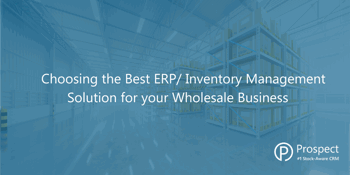
Choosing the Best ERP/Inventory Management Solution for your Wholesale Business
 Integration capabilities, suitability and implementation are just some of the key aspects to consider when choosing the best ERP/Inventory Management solution for your Wholesale business.
Integration capabilities, suitability and implementation are just some of the key aspects to consider when choosing the best ERP/Inventory Management solution for your Wholesale business.
We work closely with lots of ERP and Inventory Management Systems, including Unleashed , QuickBooks Commerce, DEAR Inventory and Xero, and we’re often asked; "how do I choose the best one for my business?".
Integration Capabilities
First and foremost, before even contemplating which system to use based on its functionality and supposed benefits, it’s vital you have a clear understanding of what you require from the system. Obviously, the functionality it offers must align with your company’s goals, but it’s not just about that.
No business likes drastic change; so the ERP/Inventory Management solution you choose should complement what’s already implemented in the business - but only if those existing solutions are also the right fit.
For businesses selling products from stock B2B, it’s critical to think about the solution’s integration capabilities to other solutions which address different business challenges, like CRM for Sales & Marketing teams. Put simply, don’t think about the solution as a silo.
Suitability is Key
Remember: all these systems will argue they’ll enhance accuracy of information, reduce stock complexities and improve process flows (these are typical, basic functions, or "hygiene factors" every single one should have as an absolute minimum) - but these aren’t necessarily a competitive advantage. So a critical differentiator will be which one more closely matches the nature of your business. For example, some may be more suited to smaller Wholesalers, Distributors and Manufacturers (e.g. breweries), whereas others more tailored for Wholesale to retail (e.g. businesses selling fashion and accessories).
Implementation, Training & Support
One of the most challenging and underestimated aspects of adopting any new system is the process of implementing it...and then getting the right people to use it in the right way from the outset (and we mean, actually using it, every day - without question). Regardless of which ERP or Inventory Management system you go ahead with, if you don’t have the right tools or training resources available, it will likely fail. By having a standard of success, you can develop a continuous process of improvement to optimise the software, mitigating the risk for implementation and making it a priority.
Once it’s been implemented, receiving the right level of support that’s responsive and helpful will also be a key to successful adoption. Modern software should have field-based help with multiple channels of support, and many of these vendors may even have a customer community to help you every step of the way.
Cloud Software Advantages
Continuous development is an essential aspect of choosing the right solution that’s going to move with the times and adapt to any market changes. Therefore, the vendor’s Development/Product team should keep you, at a minimum in line with, but ideally ahead of, your industry and the competition.
The willingness of the vendor to embrace new technological advances is crucial to selecting a solution. Your business will flourish if they’re ahead of the curve with the latest technology. A key aspect of this is, of course, cloud software. Providing you with a secure, flexible platform that doesn’t require backups and has a near limitless scale as your business grows is not only going to technologically benefit you, but it’ll benefit you financially as well. Plus, it provides a ubiquitous experience, so if you’re on the go, hopping across different countries with differing time zones, it’ll always be readily available.
